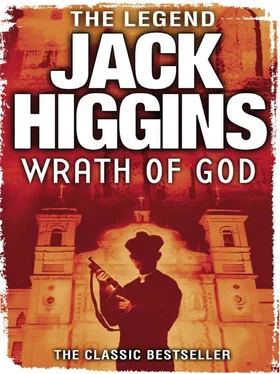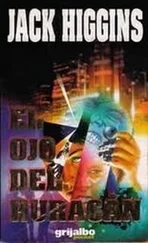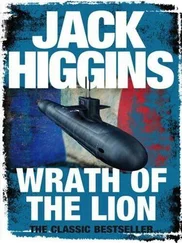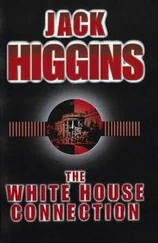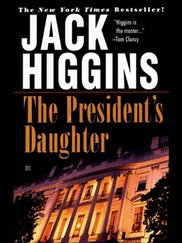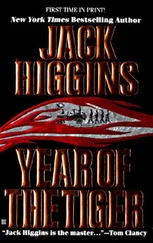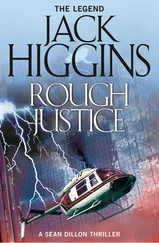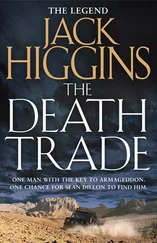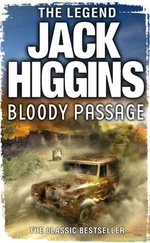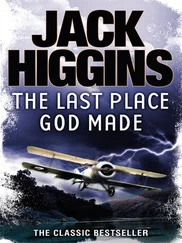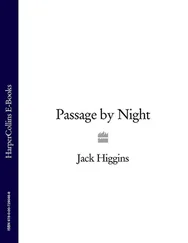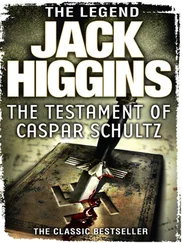Jack Higgins
The Wrath of God
For David Godfrey with thanks
Cover
Title Page
Dedication
Publisher’s Note
Foreword
Mexico
1922
1
The Chief of Police usually managed to execute somebody round…
2
When we got back to the hotel, Janos took me…
3
It was all over very quickly. The men who had…
4
The next few minutes could well have been my last…
5
My father, a dedicated Fenian till the day he died…
6
‘In the year since the Revolution there has been much…
7
We left at six o’clock on as grey and dreary…
8
Smoke drifted into the late afternoon air in a dense…
9
For years I had lived a life in which everything…
10
He gave us no chance to discuss things with him,…
11
He had brought her to witness van Horne’s humiliation and…
12
I awakened to darkness, the pulsating beat of music. Guitars…
13
I surfaced to the patter of rain against the canvas,…
14
Inside the church away from the others, Nachita filled in…
15
All I could do now was wait for Nachita for…
About the Author
Other Books by Jack Higgins
Copyright
About the Publisher
THE WRATH OF GOD was first published in the UK by Macmillan and Co. in 1971 and later by Penguin Books. This amazing novel has been out of print for some years, and in 2011, it seemed to the author and his publishers that it was a pity to leave such a good story languishing on his shelves. So we are delighted to be able to bring back THE WRATH OF GOD for the pleasure of the vast majority of us who never had a chance to read the earlier editions.
The first book I wrote after giving up a university career and becoming a full time writer. It was published in Britain and the USA with some success, but the interesting thing was that it received many film offers.
Finally, it was produced by MGM as a major movie with the great Robert Mitchum playing the strange priest who travels to Mexico during the early twenties in a huge open car but with a machine gun in his Gladstone bag. Is he really a priest is the question. The villain was played by a great Broadway star, Frank Langella and the wonderful Rita Hayworth played his mother, her last film before illness finished off her career for good. Over the years, Wrath of God has become a cult classic.
Mexico
The Chief of Police usually managed to execute somebody round about noon on most days of the week, just to encourage the rest of the population, which gives a fair idea of how things were in that part of Mexico at the time.
The sound of the first ragged volley sent my hand down inside my coat in a kind of reflex action when I was half-way up the hill from the railway station. For most of the way I had managed to stay in the shade, but when I emerged into the Plaza Civica, the sun caught me by the throat and squeezed hard, bringing sweat from every pore.
The executions were taking place in the courtyard of the police barracks and the gates stood wide open to give an uninterrupted view to anyone interested enough to watch, which on that occasion meant a couple of dozen Indians and mestizos. Not a bad audience considering the noonday heat and the frequency with which the performance was repeated.
At the rear of the small crowd an automobile was parked, a Mercedes roadster with the hood down, the entire vehicle coated with a layer of fine white dust from the dirt roads. An exotic item to find in a town like Bonito at that time. More surprising was the driver, who was getting out just as I arrived, for he was a priest, although like no other priest I’d seen outside of Ireland – a great ox of a man in a shovel hat and faded cassock.
He ignored the rest of the audience, most of whom were surprised to see him there, produced a cigarillo from a fat leather case and searched for a match. I found one before he did, struck it and held it out for him.
He turned and looked at me sharply, giving me a sight of his face for the first time. A tangled greying beard, vivid blue eyes and the unmistakable furrow of an old bullet wound along the side of his skull just above the left eye. One of the lucky ones to survive the revolution.
He took the light without a word and we stood side by side and watched as they marched three Indians across the courtyard from the jail and stood them against the wall. There were already half a dozen bodies on the ground and the wall was pitted with scars. The three men stood there impassively as a sergeant tied their hands behind their backs.
The priest said, ‘Does this happen often?’
He had spoken in Spanish, but with an accent that indicated that he was anything but Mexican.
I replied in English, ‘The Chief of Police says it’s the only way he can keep down the numbers in the jail.’
He glanced at me with a slight frown. ‘Irish?’
‘As ever was, father.’
‘A long way from home.’
New England American, or somewhere near unless I missed my guess.
‘I thought the revolution was supposed to be over?’ he said, and looked back towards the scene in the courtyard. ‘What a bloody country.’
Which was a reasonably unpriestlike remark although understandable in the circumstances. I said, ‘The discontented are always with us, father, even after revolutions. Why, there are some in these parts who think it’s still open season on priests.’
‘We’re in God’s hands,’ he said harshly. ‘All of us.’
Which was arguable, but I was prevented from taking the question up with him for one of the condemned against the wall inside the courtyard cried out sharply and pointed towards us as the sergeant was about to tie his hands.
There was some kind of disturbance and then a young officer strolled towards the gate and beckoned to the priest who left me without a word and went towards him.
‘Believe it or not, father, but one of these pigs wants to confess,’ I heard the officer say.
The priest said nothing; simply took a breviary from his pocket, spat out his cigarillo and started through the gate. By the time he reached the wall, all three were on their knees waiting for him.
I didn’t stop to watch for I had seen men die before or at least that’s what I told myself as I turned and went across the square to the Hotel Blanco on the far side. It was a tall slender building which had been used as a strong-point by the government forces during the war and the crumbling facade was pitted with bullet holes.
In the patio a fountain splashed water across scarlet tiles and the cool darkness of the terrace looked very inviting. The owner of the place lounged in a wicker chair by the screen door, fanning himself with a palm fan. His name was Janos and he was Hungarian as far as I could make out, although his English was excellent. The most noticeable thing about him was his great size. He must have been seventeen or eighteen stone at least, with a great pendulous belly and sweated constantly.
‘Ah, Mr Keogh. A hot day. You will join me in a beer?’
There were several stone bottles of lager in a bucket of water at his side. I helped myself to one and pulled the cork. As I did so, another volley sounded in the courtyard opposite. I sat on the rail beside him as the crowd began to disperse.
‘A nasty business,’ Janos said, managing to sound as if he didn’t give a damn.
‘Yes, too bad,’ I answered automatically, for I was watching for the priest.
Читать дальше
